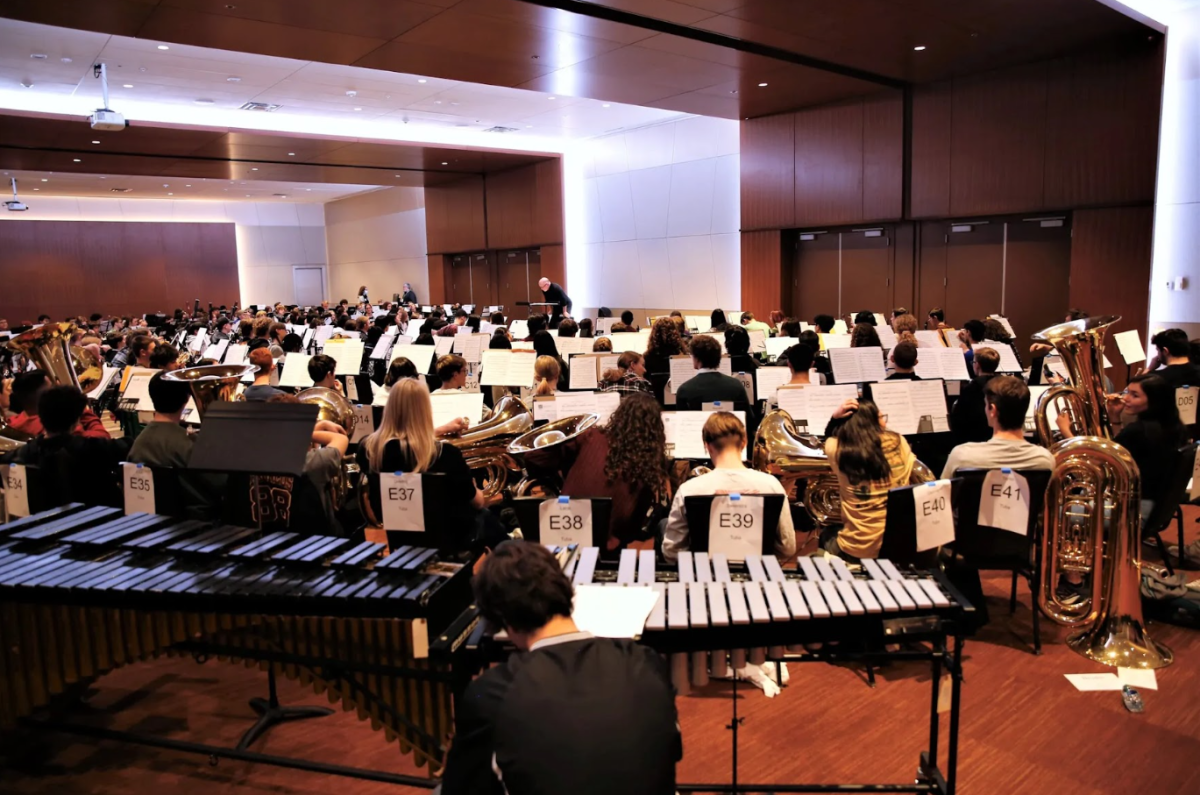In the practice rooms of McKay Chapel, the auditorium of Saint Nick’s, and the many bedrooms, basements, and music studios dotting Seattle, one can hear, among others, the sounds of intertwined voices, luscious vibratos, soaring brass, and the rhythmic drive of percussion. It is needless to say that music isn’t just a pastime for many Lakeside students — it’s a passion, woven into the fabrics of many lives of students at Lakeside. This year, several of these dedicated musicians have been awarded with places in the All-Northwest and All-State Honor Groups of the Washington Music Educators Association (WMEA).
Starting in September, prospective musicians from across the state — and biennially, from the Northwest Region — prepare and record five to six short excerpts and technical passages. Students are selected for ensembles such as Wind Symphony, Jazz Band, Orchestra, Band, or several choirs (Jazz, Treble, and Mixed) to perform the following spring at divisional conferences for the National Association for Music Education (NAfME).
The WMEA oversees three distinct Honor Groups, two of which perform annually, with the third appearing in odd-numbered years. All three will be performing this concert season (2025) in Yakima and Spokane — the Junior All-State Ensembles in Yakima, and the All-State and All-Northwest Ensembles in Spokane. The two that perform annually are the Junior AllState (for seventh and eighth graders) and the All-State (for high schoolers) Honor Groups. This year, roughly 1,900 high school students and 1,700 middle school students auditioned for the three groups. Musicians for these honor groups are selected through a rigorous audition process. Applicants submit recordings verified by their music teachers, who must be members of the WMEA or the NAfME.
Screening committees, composed of qualified WMEA or NAfME members, review each recording and rank submissions based on technical proficiency, musicality, and overall quality. Each instrument or voice category is ranked independently, and recordings that fail to meet minimum standards of quality are deemed ineligible. The committees do not select the final ensemble membership but provide a ranking recommendation for ensemble managers and conductors, who finalize the selection process by determining the specific instrumentation or voicing needs of each group. A critical part of this process is setting the cutoff point for each section. For example, the top-ranked students in each category are selected to meet 90% of the ensemble’s target capacity, at which point conductors adjust the cutoff to accommodate additional needs, including addressing underrepresented schools or maintaining artistic balance. No musician qualifying within the initial 90% is ever removed for others.
With such a competitive process for these prestigious groups, and with twenty one Lakesiders qualifying for one of the three Honor Groups, it’s hard not to wonder what music, practice, and competition look like for musicians who qualify for All-State or All-Northwest. Tatler thematically compiled interviews with Music Department faculty and several Lakesiders who were accepted to All-State or All-Northwest this year to answer just that and determine what the “Lakeside Musician,” performing at that level, looks like.
An Interview with the Lakeside Musician (LM)
Matthew K. ’28 (MK): What does your practice routine usually look like?
LM: Balancing practice with everything else can definitely feel like a juggling act — on most evenings, I try to stick to at least an hour of focused practice. Some days that means running through technical exercises and tackling tricky sections of my current pieces; other days, it’s just about enjoying the music. Even when I don’t have enough time for a full session, I still try to pick up my instrument for whatever short time I do have.
MK: Do you feel that competition is your primary driver, or is it more about a genuine love for music? How do you balance the two?
LM: For me, it’s definitely a mix, but passion always comes first. I started playing because I loved the sound and the feeling of creating music, not because I wanted to be better than anyone else. That said, competition has its place—it pushes you to grow and gives you clear goals to work toward. When I’m preparing for auditions or performances, I try to keep the focus on improvement for my own sake, not just beating someone else. Ultimately, I think competition is a tool, but passion is what keeps me coming back to music day after day.
MK: What keeps you coming back to music, even when life gets busy with other commitments or things feel overwhelming?
LM: Music is my sanctuary; it provides an emotional outlet and a sense of balance. When academics or life, in general, becomes stressful, playing my instrument allows me to decompress and reconnect with myself. There’s also something incredible about being swept up in the music — you don’t have to think about school or anything else except for the sounds around you. In orchestra at school, it’s a period where I know I can take a breath, enjoy the music, and have fun making it with friends. Playing with others often feels like being part of something bigger than yourself, and those moments are truly special.
MK: What was it like preparing for this audition, or for auditions in general?
LM: Preparing for the auditions was a mix of everything — stressful, fun, and definitely a learning experience. Some parts of the process are frustrating because you should always be chasing perfection. But at the same time, I see auditions as a chance to push yourself and really dive into the music.
MK: What’s your take on being selected for All-State/All-Northwest?
Here, the Lakeside Musician had two distinct themes to their response, both of which are reflected below.
LM: Being selected for All-State felt like a huge milestone for me. It’s such an honor to play alongside talented musicians from across the state, all of whom bring their own unique styles and skills. I’ve learned so much from the rehearsals and the conductors I’ve already had — they push you to levels you didn’t think you could reach. The experience really validates all the hard work I’ve put into practicing, and it’s exciting to be part of something bigger than just my school’s music program. It’s an experience I’ll always cherish.
LM: Don’t get me wrong — I appreciate being selected for All-Northwest, and I do truly see it as a recognition of the effort I’ve put into music. But I don’t see it as the pinnacle of what’s possible. There are other ensembles and opportunities that I feel offer a more intense or professional-level experience. All-Northwest is great for meeting other musicians and having fun, but I think of it more as a stepping stone rather than a defining achievement.


